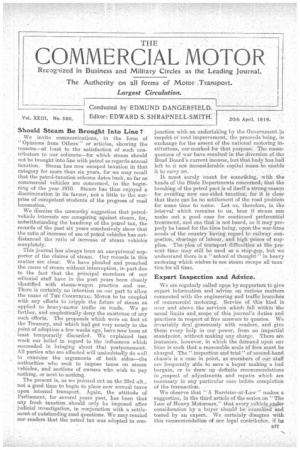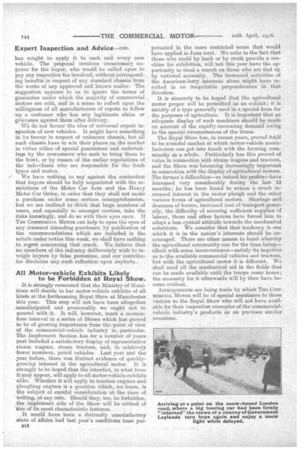Should Steam Be Brought Into Line ?
Page 1

Page 2

If you've noticed an error in this article please click here to report it so we can fix it.
We invite communications, in the form of " Opinions from Others" or articles, showing the reasons—at least to the satisfaction of such contributors to our columns—for which steam should not be brought into line with petrol as regards annual taxation. Steam has now escaped taxation in that category for more than six years, for we may recall that the petrol-taxation scheme dates back, so far as commercial vehicles are Concerned, to the beginning of the year 1910. Steam has thus enjoyed a discrimination in its favour, not a little to the surprise of competent students of the progress of road locomotion.
We dismiss the unworthy suggestion that petrolvehicle interests are conspiring against steam, for, notwithstanding the handicap of the petrol tax, the records of the past six years conclusively show that the ratio of increase of use of petrol vehicles has outdistanced the ratio of increase of steam vehicles completely.
This journal has always been an unequivocal supporter of the claims of steam. Our records in this matter are clear. We have pleaded and preached the cause of steam without interruption, in part due to the fact that the principal members of out editorial staff have in the past years been closely identified with steam-wagon practice and use. There is certainly no intention on our part to allow the name of THE COMMERCIAL MOTOR to be coupled with any efforts to "cripple the future of steam as applied to heavy-motor traffic on roads. We go further, and emphaticallydeny the existence of any such efforts. The proposals which wore on foot at the Treasury, and which had got very nearly to the point of adoption a few weeks ago, have now been at least temporarily discarded. We explained last week our belief in regard to the influences which succeeded in bringing about that postponement. All parties who are affected will undoubtedly do wen to examine the . arguments Of both sides—the authorities who seek to impose taxes on steam vehicles, and sections of owners who wishh, to pay nothing, or next to nothing.
The present is, as we pointed out on the 23rd ult., not a good time to begin to place new annual taxes upon internal transport. Again, the attitude of Parliament, for several years past, has been that any fresh taxation should only be imposed after judicial investigation, in conjunction with a settlement of outstanding road questions. We may remind our readers that the petrol tax was adopted in con junction with an undertaking by the Government i,tri respect of road improvement, the proceeds being, in exchange for the assent of the national motoring institutions, ear-marked for that purpose'. The consequences of war have resulted in the diversion of the Road Board's current income, but that body has had left to it not inconsiderable capital sums to enable it to carry, on. It must surely count for something, with the heads of the State Departments concerned, that the breaking of the petrol pact is of itself a strong reason for avoiding new one-sided taxation, for it is clear that there can be no settlement of the road problem for some time to come. Let us, therefore, in the interval which remains to us, hear if steam can make out a good case for continued preferential treatment, and one that is not based, as it may properly be based for the time being, upon the war-time needs of the country having regard to railway congestion, shortage of labour, and high prices of supplies. The plea of transport difficulties at the present time may still be used as a stop-gap, but we understand there is a " school:of thought" in heavy motoring which wishes to see steam escape all taxa tion for all time.
Expert Inspection and Advice.
We are regularly called upon by supporters to give expert information and advice on various matters connected with the engineering and traffic branches of commercial motoring. ,Service of this kind is over and above the services which fall within the usual limits and .scope of this journal's duties and practices in respect of free answers to queries. We invariably deal generously with, readers, and give them every help in our power, from an impartial standpoint, without making any charge. There are instances, however, in which the demand upon our time is such that a reasonable scale of fees must be charged. The "inspection and trial "of second-hand chassis is a case in point, as members of our staff are frequently able to save a buyer making a bad bargain, or to draw up sdefinite recommendations in irespect of adjustments and repairs which are necessary in any particular case befdre completion of the transaction.
We observe that "A Barrister-at-Law" makes a suggestion, in the third article of the series_on "The Law of Heavy Motorcars," that every vehicle under consideration by a buyer Should be 'examined and tested by an expert. We certainly disagree with this recommendation of our legal contributor, if he has sought to apply it to each and every new vehicle. The proposal involves unnecessary expense for the buyer, who would be called upon to pay any inspection fee involved, without correspondins benefitS'in respect of any standard chassis from the works of any approved and known maker. The suggestion appears to us to ignore the terms of guarantee under which the majority of commercial motors are sold, and in a sense to reflect upon the willingness of all manufacturers of repute to follow 'up a customer who has any legitimate claim or grievance against them after delivery.
We do not favour the idea of universal expert inspection of new vehicles. It might have something in its favour in respect of unknown chassis, but all such chassis have to win their places on the market in virtue either of special guarantees and undertakings by the newcomers who seek to bring them to the front, or by reason of the earlier reputations of the individuals who are responsible for the fresh types arid makes.
We have nothing to say against the contention that buy ers should. be fully acquainted with the restrictions of the Motor Car Acts and the fleavy Motor Car Order, in order that they shall not make a purchase under some serious misapprehension, but we iire inclined to think that large numbers of users, and. especially so amongst carriers, take the risks knowingly, and do so with their eyes open. If THE COMMFIRCIAL MOTOR can help to open the eyes of any innocent intending purchaser, by publication of the recommendations which are included in the article under notice this week, we shall have nothing to regret concerning that result. We believe that 'so members of :the industry deliberately wish to inveigle buyers by false pretences, and our contribu7 tor disclaims any sueh reflection upon an,ybods.
All Motor-vehicle Exhibits Likely to' be Forbidden at Royal Show. It is. strongly rumoured that the _Ministry of Munitions will decide to bar motor-vehicle exhibits of all kinds at the forthcoming Royal Show at Manchester this year. This step will not have been altogether unanticipated and presumably we ought not to quarrel. with it. It will, however,. Mark a morners, tOtls interval in a series of Shows which. has proved to be of growing impOrtance from thespoint of view a the commercial-vehicle industry in particular. Tise Implement Section-has for a number of years past 'included a satisfactory display of representative steam wasons, steam tractors, and; in relatively c 'fewer 'numbers,' petrol vehicles. Last year and the year before, there was distinct evidence of quicklygrowing interest in the agricultural motor. It" is strongl to be hoped that the interdict, in what form it_may appear, will apply to all motor-vehicle exhibits alike. Whether it will apply to traction engines and ploughing engines is a question which, we learn, is the subject of •careful consideration at the time of writing; at any rate. Should they, too, be forbidden, the implement side of the Show will be robbed of 0.J.W of its most characteristic features, It would have been a distinctly unsatisfactory state of affairs had last year's conditions been peria petuatecl in the more restricted, sense that would have applied in June next. We refer to the fact that those who could by hook or by crook provide a machine for exhibition, will not this year have the opportunity to steal a march on those who are tied up by national necessity. The increased activities_of the American-lorry interests alone might have resulted in an inequitable preponderance in that direction.
It is sincerely to be hoped. that the agricultural motor proper will be permitted, as an exhibit; it is strictly of a type generally used in a special form for the purposes of agriculture. It is important that an adequate display of such machines should be made on account of the rapidly-increasing demand owing to the special circumstances of the times. The Royal Show has, in recent years, proved_ itgelf to be asuseful market at which motor-vsthicle manufacturers can get into touch with the farming community as a whole. Particularly has this proved of value in connection with steam wagons and tractors, and the Show, was becoming increasingly important in connection with the display of agricultural motors. The farmer's difficulties—as indeed his profits—have increased very considerably during the last 12 months; he has been found. to evince a much increased interest in the motor plough and the other various forms of agricultural motors. Shortage and dearness of horses, increased Cost of transport generally, the difficulty of securing sufficient supplies of labour, these and other factors have forced him to adopt a less cynical attitude towards the mechanical substitute. We consider that that tendency is ono which it is in the nation's interests should be encouraged. There are other means to hand whereby the agricultural community can. for the time being— albeit with some inconvenience—satisfy its inquiries as to the available commercial vehicles and tractors, but with the agricultural motor it is different. We shall need all the mechanical aid in the fields that can be made available until the troops come home; ' the necessity for it afterwards will by then have be come evident. • Arrargensents are being made by which TI1K COM, MERCIAL Moron will be of special assistance to those visitors to the Royal Show who will not have available for their inspection examples of the'commercial-, vehicle industry's products as on previous similar. occasions.






















